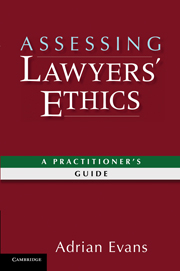Book contents
- Frontmatter
- Contents
- Preface
- List of figures
- Acknowledgements
- 1 An opportunity for law societies
- 2 Ethical failures, research and core qualities
- 3 Understanding ethical methods and types
- 4 Mechanisms to offset business pressure on legal ethics
- 5 Discovering practitioners' opinions about ethics assessment and psychological testing for integrity
- 6 Developing character
- 7 Measuring awareness of values and ethics
- 8 Entrenching ethics assessment
- Appendix A Research methods
- Appendix B Awareness of ethical type
- Appendix C Prototype scale of preference for legal ethical type
- Index
5 - Discovering practitioners' opinions about ethics assessment and psychological testing for integrity
Published online by Cambridge University Press: 10 January 2011
- Frontmatter
- Contents
- Preface
- List of figures
- Acknowledgements
- 1 An opportunity for law societies
- 2 Ethical failures, research and core qualities
- 3 Understanding ethical methods and types
- 4 Mechanisms to offset business pressure on legal ethics
- 5 Discovering practitioners' opinions about ethics assessment and psychological testing for integrity
- 6 Developing character
- 7 Measuring awareness of values and ethics
- 8 Entrenching ethics assessment
- Appendix A Research methods
- Appendix B Awareness of ethical type
- Appendix C Prototype scale of preference for legal ethical type
- Index
Summary
Why consider practitioners' views?
Since reported cases and empirical studies broadly concur that lawyers' ethics are not only deficient but also under judicial and regulatory challenge, it is sensible for the profession to seek out ways and means to remotivate lawyers to improve behaviours without more costly external intervention. At present, friendly interests in the form of indemnity insurers, some of whom are highly influenced by and sympathetic to the profession, are exploring risk management protocols to reduce the risks of negligence, but are also beginning to see in the ‘ethical infrastructure’ movement an opportunity for further risk reduction. And some innovative complaints handlers in Australia, also sympathetic to efforts to enhance professionalism, are developing structural protocols to reduce ethical misadventure among incorporated legal practices. These initiatives will assist, but they are necessarily focused on overarching infrastructure and procedures which, as discussed in the previous chapter, may not necessarily impact directly on individual lawyers.
Efforts to improve individual lawyers' ethical stance have been left to law schools, though not to any great effect. Many jurisdictions still only encourage rather than require ethics education within law schools and, if they require continuing legal education post-admission, do not require that it be assessed. In the narrow window between graduation from law school and admission there is often instruction in conduct rules, but the emphasis is on memory rather than integrating the ethical principles beneath the rules into best legal practices.
- Type
- Chapter
- Information
- Assessing Lawyers' EthicsA Practitioners' Guide, pp. 126 - 162Publisher: Cambridge University PressPrint publication year: 2010

